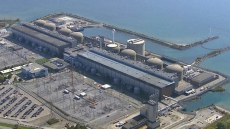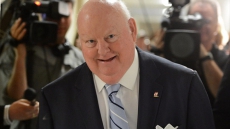The US presidential race took off with Hillary Clinton finally jumping into the fray with an aura of inevitability, but that analysts suggested may turn out to be the former secretary of state's biggest handicap.
In her second bid to break the glass ceiling and return to the White House, the former first lady chose a low key video message on social media to announce her run Sunday before heading to Iowa, the state which traditionally kicks off the primaries.
The first official event of her 2016 presidential campaign was a roundtable discussion with four students and three educators in an automotive technology classroom at a community college. There she declared her desire to "begin a conversation" with Americans on how she could "be the champion who goes to bat for Americans."
Low key or not, Clinton's entry has electrified the somewhat somnolent presidential race and generated media attention far and wide, including India, with which she has a long history going back to her first visit as first lady in 1995, unlike any other candidate.
As Alyssa Ayres, a fellow at the Council on Foreign Relations wrote in a recent blog post "First and foremost, she sees India as a crucial part of US strategy in a world increasingly centred on Asia, where, in her words, 'the future of politics will be decided.'"
"As secretary of state her focus on rebalancing US foreign policy toward Asia contained a strong emphasis on expanding ties with India, " she noted.
Within her own Democratic Party, Clinton is miles ahead of her likely rivals - none of whom have officially declared their intention to run.
According to Time magazine former Maryland Governor Martin O'Malley is polling at 1 percent and liberal Senator Bernie Sanders is at 4 percent compared with Clinton's 66 percent.
"Though both are still long shots, they could force her to compete for support from the liberal base, potentially hurting her chances in the general election," it said.
Among the Republicans, she leads former Florida governor Jeb Bush 54 percent to 40 percent in a matchup and with even larger margins over Texas Senator Ted Cruz, Wisconsin Governor Scott Walker and Florida Senator Marco Rubio, Time said.

Louisiana's Indian-American governor Bobby Jindal is still toying with the idea of a presidential run.
But potential Republican candidates lost no time attacking Clinton leaving criticism of likely primary rivals within the party for another day.
Rubio, 43, the youngest contender in the race so far, took a swipe at Clinton Monday.
"Just yesterday, a leader from yesterday," he said as cited by CNN, as the crowd erupted in boos, "began a campaign for President by promising to take us back to yesterday. But yesterday is over, and we are never going back."
Kentucky Senator Rand Paul released a video ad critical of Clinton hours before she officially declared her candidacy Sunday saying she "represents the worst of the Washington machine, the arrogance of power, corruption and cover-up".
Cruz, another official 2016 GOP candidate, questioned her success as secretary of state saying "Hillary Clinton represents the failed policies of the past".
Bush turned the Clinton debut into a fundraising opportunity telling his supporters in an email that "Hillary plans to raise $1.7 billion to win the White House ... which is why I'm asking you to give $5 right now" to "stop her."
With hardly any opposition worth the name, Clinton may easily win the Democratic primary, but "she'll face a battle-tested Republican opponent who will be in tip-top shape to take on the Democrats," Time suggested.
However, her "supporters argue that even without a major primary fight, she'll be ready too," it said.




